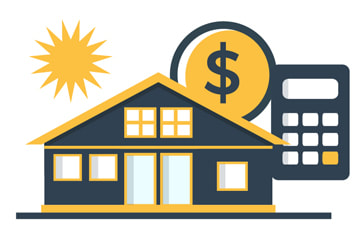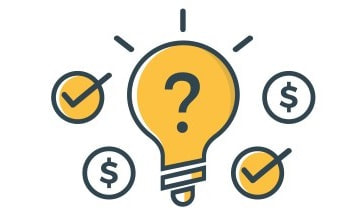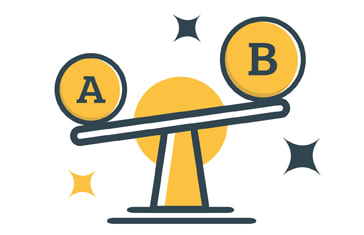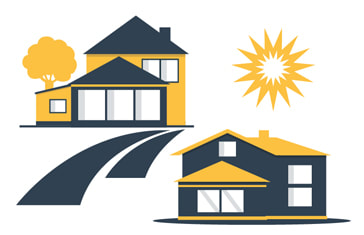High Deposit (High Equity) Mortgages - The Definitive New Zealand Guide
If you’re lucky enough to have a large deposit to buy a home, our guide explains what this means in terms of lenders and rates, the pros and cons of doing so, fees you'll avoid and helpful must-know facts.
Updated 9 August 2023
Summary:
This guide is published to explore the concept of high deposits in the context of purchasing a home. We cover:
Know This First: Purchasing a home is a significant financial decision, and the amount of the deposit you put down can have a major impact on your mortgage and the overall cost of the home. A high deposit can offer several benefits, including lower monthly mortgage payments and a better interest rate, but it also requires a significant upfront financial commitment. Please be aware:
- With the Reserve Bank of New Zealand hiking the Official Cash Rate (OCR) aggressively since early 2022, many New Zealanders wonder how they can put themselves in a better financial position regarding their mortgages and minimising ongoing interest costs.
- One of the ways this can be done is to put up a higher deposit amount when purchasing a home. However, there is some uncertainty and confusion about the impact and benefits of putting up a higher deposit.
- Be aware, the large tier 1 banks (ANZ, ASB, Westpac, BNZ) don’t publicly disclose the associated discounts depending on the amount of deposit you put up, but our research suggests most banks will apply a 10-30 basis point discount to the carded mortgage rate depending on how high the deposit amount is. This means a 0.10% to 0.30% p.a. discount on the advertised mortgage rate.
This guide is published to explore the concept of high deposits in the context of purchasing a home. We cover:
- What Deposit Amount is Considered a "High Deposit"?
- Buying a Home with a High Deposit - Pros and Cons
- When Does it Make Sense to Put Up Higher Deposits When Buying a House?
- Must-Know Considerations Before Agreeing to any Mortgage Deal
- Frequently Asked Questions
Know This First: Purchasing a home is a significant financial decision, and the amount of the deposit you put down can have a major impact on your mortgage and the overall cost of the home. A high deposit can offer several benefits, including lower monthly mortgage payments and a better interest rate, but it also requires a significant upfront financial commitment. Please be aware:
- Each bank will have a different policy for applying high deposit mortgage rate discounts or low equity premiums.
- The higher the deposit, the less you need to borrow (and the better a rate you’re likely to get).
- A high deposit will result in lower monthly mortgage payments.
- Borrowers who put down a high deposit will likely be able to avoid paying the lender's mortgage insurance (LMI).
- Putting in a high deposit requires a significant upfront financial commitment and may limit your flexibility in other financial decisions.
What Deposit Amount is Considered a "High Deposit"?
When purchasing a home, one of the most important factors is the amount of money you’ll need to deposit. In New Zealand, the deposit amount can vary widely, but generally, a high deposit is considered to be any amount higher than 20% of the home's purchase price. A high deposit can be a significant financial burden, but it can offer several benefits, including lower mortgage payments and the ability to secure a better interest rate.
For example, if you're looking to purchase a home for $500,000, a high deposit would be above $100,000. While 20% is the general benchmark for a high deposit, it's important to note that the amount can vary depending on the lender and the specific terms of the mortgage. Some lenders may require a higher deposit, while others may be willing to accept a lower amount. Therefore, shopping around and comparing different lenders is important to find the best deal for your needs - not all banks will reward you for having a high deposit.
For example, if you're looking to purchase a home for $500,000, a high deposit would be above $100,000. While 20% is the general benchmark for a high deposit, it's important to note that the amount can vary depending on the lender and the specific terms of the mortgage. Some lenders may require a higher deposit, while others may be willing to accept a lower amount. Therefore, shopping around and comparing different lenders is important to find the best deal for your needs - not all banks will reward you for having a high deposit.
How does a "high deposit" amount differ from a "Low equity" mortgage?
A high deposit mortgage is one in which the borrower puts down a larger amount of money upfront, while a low equity mortgage is one in which the borrower puts down a smaller amount of money upfront. The term "low equity" refers to the amount of equity the borrower has invested in the property, which is determined by the difference between the purchase price of the home and the amount of the mortgage.
In general, a low equity mortgage will have a higher loan-to-value (LTV) ratio, which means that the lender is taking on a greater level of risk. This increased risk can result in higher interest rates and stricter lending criteria for borrowers seeking a low-equity mortgage.
To summarise the above in a formula:
In general, a low equity mortgage will have a higher loan-to-value (LTV) ratio, which means that the lender is taking on a greater level of risk. This increased risk can result in higher interest rates and stricter lending criteria for borrowers seeking a low-equity mortgage.
To summarise the above in a formula:
- “High deposit” = “high equity” = “low loan-to-value (LTV) ratio” = more likely to get a lower mortgage interest rate and not need to pay lender’s mortgage insurance (LMI).
- “Low deposit” = “low equity” = “high loan-to-value (LTV) ratio” = likely to get a higher mortgage interest rate and be required to pay lender’s mortgage insurance (LMI).
An example of a typical high deposit (high equity) mortgage situation:
- Jane wants to purchase a home in rural Southland for $400,000. She has saved up a deposit of $100,000, which is equal to 25% of the purchase price. Jane applies for a mortgage with a lender, and because she has a high equity in the property (more than 20% of the purchase price), the lender does not require her to pay a low equity margin.
- In this case, the mortgage amount would be $300,000 ($400,000 purchase price - $100,000 deposit). Because Jane has put down a high deposit, the lender may be willing to offer her a lower interest rate on her mortgage, which would result in lower monthly payments.
- In addition, Jane may be able to avoid paying lender’s mortgage insurance (LMI), which is typically required for borrowers who put down a deposit of less than 20% of the purchase price.
Know This: A high deposit can offer several benefits, including lower monthly mortgage payments and a better interest rate. However, it is important to carefully consider the trade-offs of putting down a high deposit, such as the upfront financial commitment and the opportunity cost of using a large amount of money to fund the deposit.
An example of a low deposit (low equity) mortgage situation:
- John wants to purchase a home for $400,000. He has saved up a deposit of $50,000, which is equal to 12.5% of the purchase price. John applies for a mortgage with a lender, but because he has low equity in the property (less than 20% of the purchase price), the lender requires him to pay a low equity margin.
- The lender determines that the low equity margin for John's mortgage will be 2%. This low equity margin means that John will need to pay an additional 2% on top of his mortgage amount to compensate for the increased risk that the lender is taking on by lending to a borrower with low equity in the property.
- In this case, the mortgage amount would be $350,000 ($400,000 purchase price - $50,000 deposit). The low equity margin would be $7,000 (2% of $350,000), so the total amount that John would need to borrow would be $357,000 ($350,000 mortgage + $7,000 low equity margin).
Know This: This example shows that John's monthly mortgage payments would be higher than if he had put down a higher deposit and was not required to pay the low equity margin. Therefore, it's important for borrowers to be aware of any low equity margins and to carefully consider the impact they may have on the overall cost of the mortgage.
Buying a Home with a High Deposit - Pros and Cons
There are several benefits and downsides to putting in a high deposit when purchasing a house.
Pros:
Pros:
1. Lower mortgage interest payments.
One of the main benefits of putting in a high deposit is that it will result in lower monthly mortgage payments. This lower monthly payment occurs because a larger deposit means you'll need to borrow less money from the lender, which will reduce the size of your mortgage and the amount you need to pay back each month.
2. More favourable interest rates.
Borrowers who put down a high deposit may also be able to secure a better interest rate on their mortgage. This favourable rate occurs because lenders view borrowers with a high deposit as less risky, as they have a greater stake in the property and are less likely to default on their loan. As a result, lenders may be willing to offer a lower interest rate to these borrowers.
3. Increased negotiating power with banks or lenders.
A high deposit can also increase negotiating power when purchasing a home. Having a larger amount of cash on hand makes you a more attractive buyer to sellers, potentially allowing you to negotiate a lower purchase price.
4. Fewer lender’s mortgage insurance (LMI) requirements.
Borrowers who put down a high deposit may also be able to avoid paying mortgage insurance, which is a type of insurance that protects the lender in case the borrower defaults on their loan. In New Zealand, mortgage insurance is typically required for borrowers who put down a deposit of less than 20% of the home's purchase price. By putting down a high deposit, you may be able to avoid this additional cost.
Cons:
While there are many benefits to putting in a high deposit when purchasing a house, there are also a few downsides to consider:
While there are many benefits to putting in a high deposit when purchasing a house, there are also a few downsides to consider:
1. Higher upfront cost (through a larger deposit amount).
One of the main downsides of putting in a high deposit is that it requires a significant upfront financial commitment. This upfront cost can be a burden for those who cannot save a large amount of money or tap into other funding sources, such as a gift from a family member or a loan from a friend.
2. The opportunity cost of using that deposit money elsewhere.
Another potential downside of putting in a high deposit is the opportunity cost of using a large amount of money to fund the deposit. However, this money could potentially be invested elsewhere, such as in a term deposit or in managed funds which could result in a higher return on investment over the long term.
3. Limited flexibility.
A high deposit can limit your flexibility when making other financial decisions. For example, suppose you have a significant amount of money tied up in a mortgage deposit. In that case, you may not have as much liquidity to cover unexpected expenses or to make other investments.
When Does it Make Sense to Put Up Higher Deposits When Buying a House?
There are multiple situations in which it may be best to put down a higher deposit when buying a house:
If you have the financial resources to increase your deposit amount without straining your finances.
If you have the financial resources to put down a higher deposit, it can be a good idea to take advantage of a high deposit's benefits, such as lower monthly mortgage payments and a better interest rate.
If you already have a high debt-to-income ratio and want to be more prudent with debt.
If you already have a high debt-to-income ratio, it may be a good idea to put down a higher deposit to reduce the size of your mortgage and the amount you need to borrow. This reduced mortgage size can help to improve your debt-to-income ratio and make you a more attractive borrower to lenders.
If you're concerned about your job security or the stability of your current role.
If you're worried about the stability of your employment or your ability to make regular mortgage payments, putting down a higher deposit can provide additional financial security. With a high deposit, you will have a larger equity stake in the property and may be less likely to default on your loan if you experience financial difficulties. There is less risk of any negative equity.
If you're planning to stay in the property for a long time.
If you're planning to stay in the property for a long time, putting down a higher deposit can help you build property equity more quickly. This increased equity can be beneficial if you eventually decide to sell the property or if you need to borrow against your equity in the future.
Ultimately, deciding whether to put down a higher deposit when buying a house depends on your financial situation and goals. Therefore, it's important to consider your needs and priorities before deciding.
Ultimately, deciding whether to put down a higher deposit when buying a house depends on your financial situation and goals. Therefore, it's important to consider your needs and priorities before deciding.
Must-Know Considerations Before Agreeing to any Mortgage Deal
1. Shop around and talk to all the relevant banks for the best rate possible.
It's important to shop around and compare different lenders and mortgage products to find the best deal for your needs. This comparison can help you secure a better interest rate and save money over the long term. Don't rush into any deal - given your deposit size, you're valuable and low-risk to lenders so there is no urgency to sign a deal.
There are various mortgage products available in New Zealand, each with its unique features and benefits. Therefore, it's important to research and compare different products to find the one that best meets your needs and financial situation. For a comprehensive comparison on bank mortgage interest rates in New Zealand, visit our guide to this week's best fixed and floating mortgage rates.
There are various mortgage products available in New Zealand, each with its unique features and benefits. Therefore, it's important to research and compare different products to find the one that best meets your needs and financial situation. For a comprehensive comparison on bank mortgage interest rates in New Zealand, visit our guide to this week's best fixed and floating mortgage rates.
2. Budget for the long-term cost of a mortgage.
While a high deposit may result in lower monthly mortgage payments, it's important to consider the long-term cost of the mortgage and factor in a rise in interest rates. Our mortgage calculator shows what the total costs can be, exclusive of any applicable fees or charges.
3. If unsure, discuss the different mortgage or deposit options with a mortgage broker or financial advisor.
If you're unsure about purchasing a home or taking out a mortgage, it's a good idea to seek the advice of a professional, such as a mortgage broker or financial advisor. These professionals can help you understand the options available and guide you towards the best solution for your needs.
Frequently Asked Questions
What is a high deposit mortgage?
A high-deposit mortgage is one in which the borrower puts down a larger amount of money upfront as a deposit. In New Zealand, a high deposit is generally considered to be any amount higher than 20% of the home's purchase price.
What should I consider when deciding how much of a deposit to put down on a home?
There are several factors to consider when deciding how much of a deposit to put down on a home, including your financial situation, long-term goals, and mortgage terms. It's important to carefully weigh the benefits and downsides of putting in a high deposit and to seek the advice of a professional if you have any questions or concerns.
Can I use a gift or loan from a family member as a deposit?
Yes, it's possible to use a gift or loan from a family member as a deposit when purchasing a home. However, you'll likely need to provide documentation to the lender to prove that the funds are available and are not being used as collateral for any other loans.
Can I use my KiwiSaver as a deposit?
Using your KiwiSaver (retirement savings) as a deposit when purchasing a home is possible. However, there will be certain criteria that you need to satisfy before you can successfully draw down your KiwiSaver to contribute towards your deposit (such as minimum contribution duration and whether you're purchasing your first home or not).
Additionally, it's important to carefully consider the long-term implications of using your retirement savings, as it may impact your ability to retire comfortably. For a further breakdown of KiwiSaver in the context of house deposits, check out our definitive guide to the KiwiSaver First-Home Withdrawal.
Additionally, it's important to carefully consider the long-term implications of using your retirement savings, as it may impact your ability to retire comfortably. For a further breakdown of KiwiSaver in the context of house deposits, check out our definitive guide to the KiwiSaver First-Home Withdrawal.
Is it good to put down a high deposit on a home?
Whether it's a good idea to put down a high deposit on a home depends on your financial situation and priorities. A high deposit can offer several benefits, including lower monthly mortgage payments and a better interest rate.
However, it also requires a significant upfront financial commitment and may limit your flexibility in other financial decisions. Therefore, it's important to carefully consider your needs and goals before deciding how much of a deposit to put down.
However, it also requires a significant upfront financial commitment and may limit your flexibility in other financial decisions. Therefore, it's important to carefully consider your needs and goals before deciding how much of a deposit to put down.
Can I get a mortgage with a low deposit in New Zealand?
Yes, getting a mortgage with a low deposit in New Zealand is possible. However, lenders may have stricter lending criteria and higher interest rates for borrowers who put down a low deposit, as they are taking on a greater level of risk. So it's important to shop around and compare different lenders and mortgage products to find the best deal for your needs. Mortgage brokers are very helpful in such a task.
Is it better to put down a high deposit or invest the money elsewhere?
Whether it's better to put down a high deposit or invest the money elsewhere depends on your financial situation and goals. A high deposit may result in lower monthly mortgage payments and a better interest rate, but it also requires a significant upfront financial commitment. Investing the money elsewhere may result in a higher return on investment over the long term, but it may also involve a higher level of risk. Therefore, it's important to carefully consider your needs and priorities before deciding how to use your money.
What is Lenders Mortgage Insurance (LMI)? Do I need to pay it if I have a high deposit (low mortgage) when purchasing a house?
Lenders Mortgage Insurance (LMI) is a type of insurance that protects the lender if the borrower defaults on their mortgage. It's typically required for borrowers who put down a deposit of less than 20% of the home's purchase price, as these borrowers are considered to be at a higher risk of default.
LMI is typically paid by the borrower as a one-time premium when closing the mortgage. The premium is based on the size of the mortgage and the lender's assessment of the borrower's risk profile. Generally, borrowers with a lower credit score or a higher debt-to-income ratio will be required to pay a higher LMI premium.
If you have a high deposit (low mortgage) when purchasing a house, you may not be required to pay LMI; LMI is typically required for borrowers who put down a deposit of less than 20% of the home's purchase price. If you put down a higher deposit, you may be able to avoid the LMI premium. However, it's important to check with the lender to confirm whether LMI is required and, if so, how much the premium will be.
Know This: LMI is an additional cost that can significantly increase the overall cost of the mortgage. Therefore, borrowers who must pay LMI may want to consider putting down a higher deposit to avoid this additional cost. However, it's also important to carefully consider the trade-offs of putting down a high deposit, such as the upfront financial commitment and the opportunity cost of using a large amount of money to fund the deposit.
LMI is typically paid by the borrower as a one-time premium when closing the mortgage. The premium is based on the size of the mortgage and the lender's assessment of the borrower's risk profile. Generally, borrowers with a lower credit score or a higher debt-to-income ratio will be required to pay a higher LMI premium.
If you have a high deposit (low mortgage) when purchasing a house, you may not be required to pay LMI; LMI is typically required for borrowers who put down a deposit of less than 20% of the home's purchase price. If you put down a higher deposit, you may be able to avoid the LMI premium. However, it's important to check with the lender to confirm whether LMI is required and, if so, how much the premium will be.
Know This: LMI is an additional cost that can significantly increase the overall cost of the mortgage. Therefore, borrowers who must pay LMI may want to consider putting down a higher deposit to avoid this additional cost. However, it's also important to carefully consider the trade-offs of putting down a high deposit, such as the upfront financial commitment and the opportunity cost of using a large amount of money to fund the deposit.
What is a Low Equity Premium (LEP) or Low Equity Margin (LEM)?
A low equity premium (also known as low equity margin) is an additional charge that some lenders may apply to a mortgage when the borrower has a low equity in the property. Equity refers to the difference between the property's value and the mortgage amount. Hence, a low-equity mortgage is one in which the borrower has a small amount of equity relative to the property's value.
Lenders may charge a low equity premium to compensate for the increased risk they are taking on by lending to a borrower with a low equity in the property. This risk is typically higher because the borrower has a smaller financial stake in the property, which may make them more likely to default on the loan.
The amount of the low equity premium will vary depending on the lender and the specific terms of the mortgage. It's usually expressed as a percentage of the mortgage amount and may be added to the interest rate or applied as a separate charge.
Again, like LMI, it's important to be aware of any low equity premiums when shopping for a mortgage, as they can significantly increase the overall cost of the loan. Borrowers with a low equity in the property may want to consider putting down a larger deposit to avoid the low equity premium or may want to shop around and compare different lenders to find the best deal.
Lenders may charge a low equity premium to compensate for the increased risk they are taking on by lending to a borrower with a low equity in the property. This risk is typically higher because the borrower has a smaller financial stake in the property, which may make them more likely to default on the loan.
The amount of the low equity premium will vary depending on the lender and the specific terms of the mortgage. It's usually expressed as a percentage of the mortgage amount and may be added to the interest rate or applied as a separate charge.
Again, like LMI, it's important to be aware of any low equity premiums when shopping for a mortgage, as they can significantly increase the overall cost of the loan. Borrowers with a low equity in the property may want to consider putting down a larger deposit to avoid the low equity premium or may want to shop around and compare different lenders to find the best deal.
Do banks offer discounts if I put up higher deposit amounts when taking out a mortgage? Where can I find out which banks offer discounts?
It depends. The large tier 1 banks (ANZ, ASB, Westpac, BNZ) don’t publicly disclose the associated discounts depending on the amount of deposit you put up, but our research suggests most banks will apply a 10-30 basis point discount to the carded mortgage rate depending on how high the deposit amount is. This means a 0.10% to 0.30% p.a. discount on the advertised mortgage rate.
However, note that the high deposit discounts for mortgage rates will vary depending on each bank's current promotional period. To find out the current discounts, reach out to the relevant banks and ask them whether they're providing high deposit discounts.
However, note that the high deposit discounts for mortgage rates will vary depending on each bank's current promotional period. To find out the current discounts, reach out to the relevant banks and ask them whether they're providing high deposit discounts.
What's the difference between a low equity margin and a lender's mortgage insurance? Are they the same?
Low equity margin (LEM) and lender's mortgage insurance (LMI) are different.
- Low equity margin (LEM) refers to the extra percentage of the loan amount that a lender may require a borrower to pay if the borrower has a small amount of equity in the property they are trying to buy or refinance. Equity is the difference between the property's value and the loan amount. For example, if a borrower has a 20% down payment on a property they are trying to purchase, they would have 20% equity. Therefore, if the lender has a low equity margin requirement of 2%, and the borrower has 20% equity, the borrower would be required to pay an additional 2% of the loan amount as a low equity margin.
- Lender's mortgage insurance (LMI) is a type of insurance that protects the lender if the borrower defaults on their mortgage. LMI is typically required when the borrower has a small down payment (less than 20% of the purchase price) or when the borrower has a high debt-to-income ratio. The borrower is responsible for paying the premiums for LMI, which can be a significant cost depending on the size of the loan and the borrower's creditworthiness.
- In summary, a low equity margin is an additional fee that a lender may require a borrower to pay if the borrower has a small amount of equity in the property they are trying to buy or refinance. At the same time, LMI is a one-off fee to pay for insurance that protects the lender if the borrower defaults on their mortgage.
Mortgage Essentials:
Other Mortgage Options:
- Best Home Loans Offers
- Mortgage Calculator
- How Much Can I Borrow?
- Mortgage Repayment Calculator
- Mortgage Options
- Mortgage Cashback
- Mortgage Break Fees
Other Mortgage Options:






